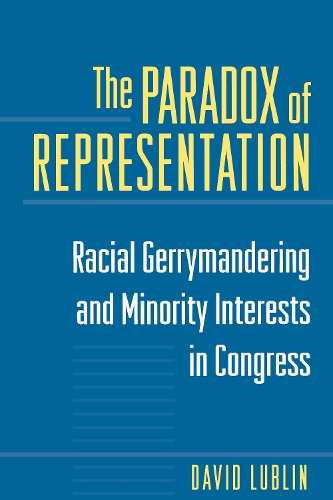
The Paradox of Representation: Racial Gerrymandering and Minority Interests in Congress
(Paperback)
Publishing Details
The Paradox of Representation: Racial Gerrymandering and Minority Interests in Congress
By (Author) David Lublin
Princeton University Press
Princeton University Press
19th October 1999
United States
Classifications
Professional and Scholarly
Non Fiction
Central / national / federal government
Ethnic groups and multicultural studies
Social discrimination and social justice
Racism and racial discrimination / Anti-racism
328.73073455
Physical Properties
Paperback
176
Width 152mm, Height 235mm
255g
Description
This text offers an analysis of a vast range of rigorous, empirical evidence that exposes the central paradox of racial representation: racial redistricting remains vital to the election of African Americans and Latinos but makes Congress less likely to adopt policies favoured by blacks. The book's evidence, together with policy recommendations for improving minority representation, aims to make observers of the political scene reconsider the avenues to fair representation. Using data on all representatives elected to Congress between 1972 and 1994, Lublin examines the link between the racial composition of a congressional district and its representative's race as well as ideology. The author confirms the view that specially drawn districts must exist to ensure the election of African Americans and Latinos. He also shows, however, that a relatively small number of minorities in a district can lead to the election of a representative attentive to their interests. When African Americans and Latinos make up 40 per cent of a district, according to Lublin's findings, they have a strong liberalizing influence on representatives of both parties; when they make up 55 per cent, the district is almost certain to elect a minority representative. Lublin notes that particularly in the South, the practice of concentrating minority populations into a small number of districts decreases the liberal influence in the remaining areas. Thus, a handful of minority representatives, almost invariably Democrats, win elections, but so do a greater number of conservative Republicans. The author proposes that establishing a balance between minority-majority districts and districts where the minority population would be slightly more dispersed, making up 40 per cent of a total district, would allow more African Americans to exercise more influence over their representatives.
Reviews
"A soundly reasoned and persuasively argued analysis of a pressing contemporary issue."--Choice
Author Bio
David Lublin is Assistant Professor in the Department of Government and International Studies at the University of South Carolina.
